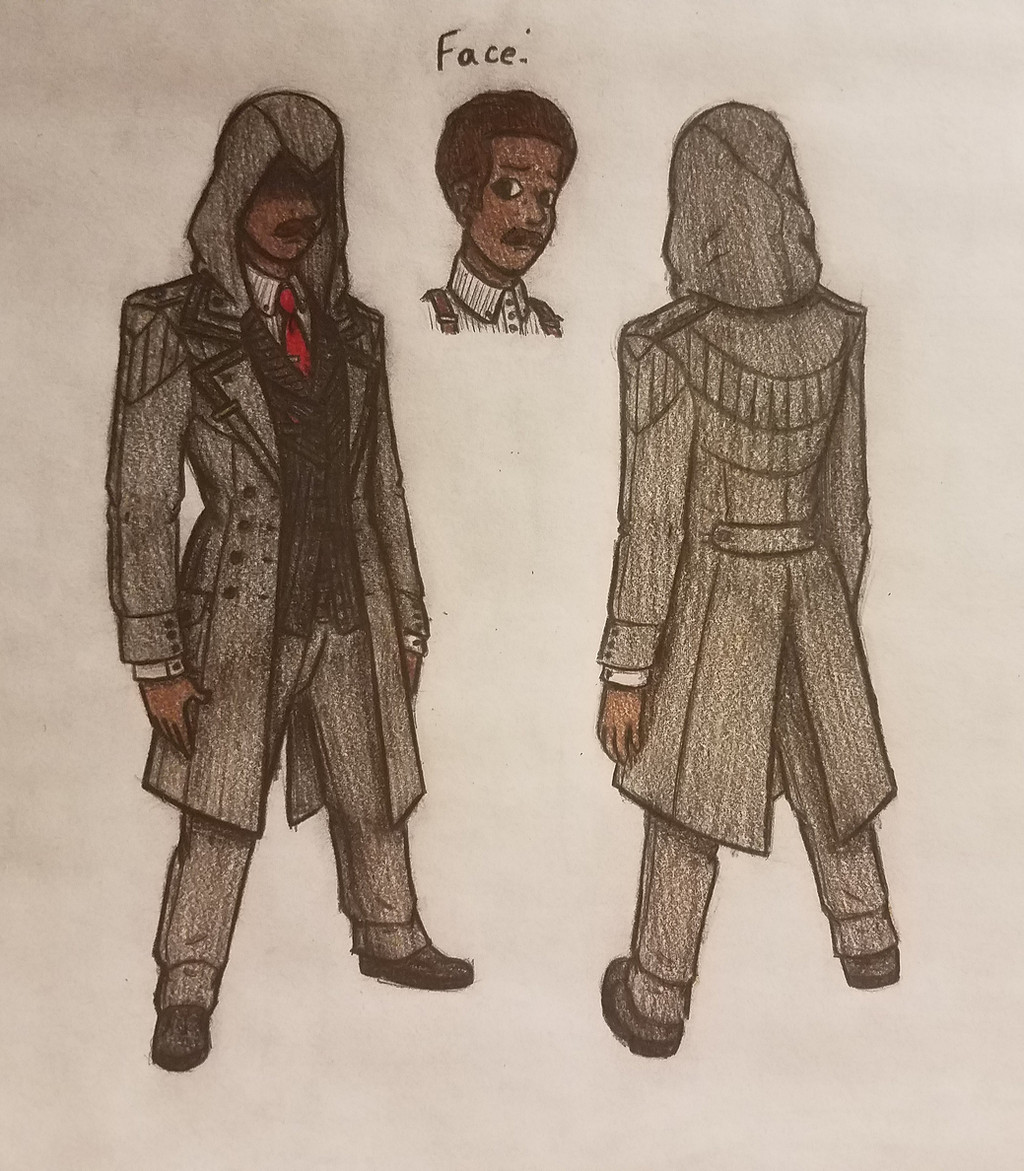HOME | DD
 Avapithecus — Fulton Falcone
Avapithecus — Fulton Falcone

#african #american #assassin #black #civil #creed #fanart #grandfather #movement #nonviolence #oc #pacifist #reference #rights #sheet #assassinscreed
Published: 2017-11-27 15:24:44 +0000 UTC; Views: 1931; Favourites: 26; Downloads: 0
Redirect to original
Description
Name: Fulton Falcone
Born: May 17, 1940; Montgomery, Alabama
Died: February 24, 1976; Pine Ridge Indian Reservation, South Dakota (age 35)
Allegiance: Assassins
Bio: Fulton was born in 1940 to two Assassins: an African American woman named Zipporah Grant, and an Italian-American named Arnie Falcone. He grew up in a poor neighborhood of Montgomery, Alabama, where all his life he faced discrimination and segregation for his skin color. It took a heavy toll on the boy, sending him into a deep depression that even his optimistic parents couldn't fix. Water fountains and bathrooms were segregated, he was always forced to sit at the back of the bus, and he often got beat up by the white citizens of the town simply because of his race. He could barely hold down a part-time job to help support his family too. Even when the Supreme Court ruled in the 1954 Brown v. Board of Education case that segregation of schools was unconstitutional, he was still treated like an outcast. For a while it seemed to him that he was doomed to stay that way, doomed to be hated. These thoughts swarmed his mind one night as he was coming home on the bus from work on December 1, 1955. However, something interrupted his silent brooding. An African American woman named Rosa Parks refused to give up her seat on the bus to a white passenger. This refusal got her arrested, and when Fulton tried to stick up for her, he met the same fate. Later that afternoon, the two were bailed out by Parks’s friends in the NAACP, Edgar Nixon and Clifford Durr. Fulton was given shelter at their headquarters for the night, and they explained their goals of fighting for freedom and equality, two things which drastically appealed to him. He went home that night with the beginnings of a new way of thinking, one where he realized that perhaps not all hope had to be lost.
He spoke with his mother about the whole ordeal the following morning, and she seemed to take pride in his enthusiasm for it, explaining that the devotion of freedom was the exact thing that drew her into the Assassin Brotherhood in the 1920s. After a while of thinking, Fulton threw in with the NAACP and their new plan to begin what is now known as the Montgomery Bus Boycott. He met them at one of their early meetings, and there he was introduced to a charismatic Baptist minister named Dr. Martin Luther king Jr., who would have a profound impact on Fulton’s life. Fulton offered to aid the Boycott using the Assassins’ resources (mostly blades), but King told him no. Fulton was baffled, but King sat him down and explained his philosophy of showing love and nonviolent protest. It took a while for that idea to sink in, but Fulton hesitantly agreed to keep his blades clean. And when the Boycott finally succeeded in 1956, he decided to put his weapons away for good. He realized he didn't have to draw blood in order to fight the Templars that were using the legal system as their shield to carry out oppression. He just had to rely on the hearts of humankind.
This ideology would often be challenged, though. In 1957, the Templar governor of Arkansas, Orval Faubus, refused to obey desegregation laws and he sent the Arkansas National Guard to aid a horde of segregationists in preventing nine African American students from entering Little Rock Central High School. Fulton’s initial instinct was to assassinate Faubus, but he remembered King’s words and instead tried to find a more indirect route. He travelled to Washington DC and sought an audience with President Dwight Eisenhower, asking him to do something about the crisis. Eisenhower eventually agreed to send the in the 101st Airborne Division to crack down the protest and walk the nine kids to school, guarding them for a whole year to protect them against the white mob. Another emerging obstacle to Fulton’s thinking was another black activist by the name of Malcolm X, who held the opposite opinion of King (whom Malcolm X labeled a chump and his followers stooges). Malcolm X rallied his supporters under ideals of black-supremacy and extreme hatred and violence towards all white people. Fulton feared this would give the Templars the perfect excuse to crack down hard against the Civil Rights Movement, and so he met with Malcolm X on multiple occasions trying to sway him over. He failed every time.
By 1963, the goal to grant all African Americans the right to vote had emerged. Fulton met with King again and joined him and all his supporters during the March on Washington for Jobs and Freedom. On that day, King gave his famous and moving “I Have a Dream” Speech, which further solidified Fulton’s idea that nonviolence was the way to go. Around this same time Fulton managed to meet with Robert F. Kennedy and gain the support of him and his allies against the Templars. King and Malcolm X met for the first and only time in 1964, when the latter gave a speech explaining that he supported getting the vote, but that he didn't have much hope that white people would give it to them unless they were held at gunpoint. Malcolm X’s radical ways also got him in trouble with his organization, the Nation of Islam, who began to send multiple death threats and made many attempts on his life. Fulton met with him again in February 1965 in a last ditch attempt to make him change his ways, but Malcolm X was shot dead by his enemies before he would even listen. Fulton left with a heavy heart.
Fulton did his best to support the Civil Rights Movement throughout 1966 and 1967, trying not to let the world push him back down, trying to stay strong and hopeful. In 1968, however, something tragic happened that nearly caused him to lose it. A Templar agent named James Earl Ray shot King dead in Nashville, causing mass mourning and disturbance across the nation. Fulton, infuriated that a hero like King would go out in such a manner, strapped on his hidden blade for the first time in years and hunted down Ray in a blind fury. His hunt took him all the way to England, where he met with a fellow Assassin named Amoldine Arlington. The two worked together to corner Ray, whom Fulton pinned against a wall as he put his hidden blade up against his throat. However, as Fulton looked into the man's terrified eyes, he changed his mind. He retracted his blade and handed Ray over to the police to be arrested. He knew King would not want him to stoop to such lows, to throw away everything they had fought for. He returned to the States, leaving his hidden blade behind in England so that he would never touch it again. He returned to find that the Civil Rights Act had been passed while he was busy hunting, and that his people finally had the vote. They had won.
In July 1971, Fulton found himself at Mount Rushmore, trying to recover from the grief that his mother's death the previous year had put on him. It was there that he met a young Lakota woman named Wanbli Arlie, a member of the Red Power Movement and a fellow Assassin. The two became immediate friends and eventually lovers, though their relationship would become quite rocky over the years. Wanbli had a hot-headed temper and was firmly set in the idea that killing the Templars was the only way to end the oppression. Fulton always tried to argue against these claims and teach her about nonviolence, though she always ignored him. On November 13, 1973, their daughter Kiki was born on the Pine Ridge Indian Reservation where Wanbli operated. It was a hard place for a child, and her parents did their best to give her as good a life as possible. They bottled up their arguments all the time until they were out of hearing range from Kiki, which only made tensions worse. The last interaction Fulton and Wanbli had was an argument about their views on violence, and then Fulton was suddenly shot dead in 1975. Wanbli was left alone, shattered both emotionally and morally as she mourned for her loss
Fulton is the grandfather of Ava Arlie.
Related content
Comments: 6

why is this man reminded me men in black ???*with hooded version*
👍: 0 ⏩: 0

How many characters are their now? I lost count a long time ago. Fulton looks nice by the way.
👍: 0 ⏩: 1

Tbh I lost count too XD
And thanks
👍: 0 ⏩: 1



























